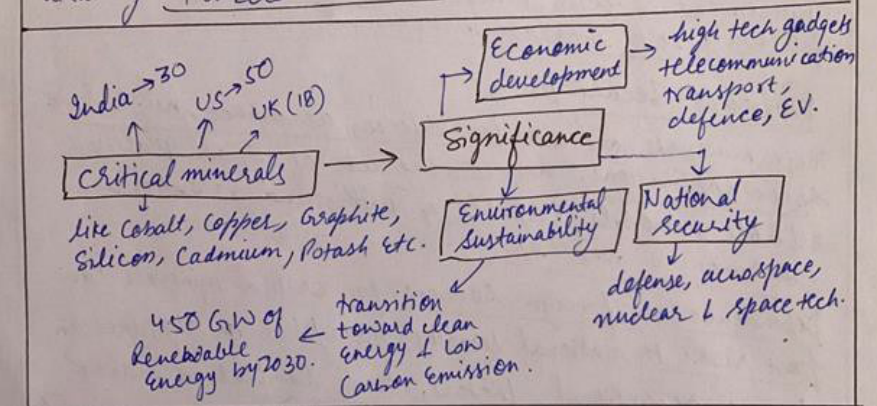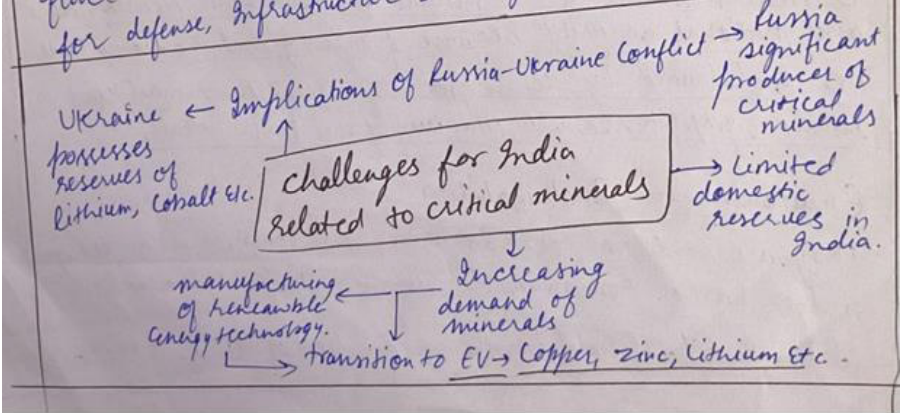
Critical minerals play a pivotal role in fostering economic development and ensuring national security in India, serving as the bedrock for various industries and technological advancements. These minerals, encompassing rare earth elements, lithium, cobalt, and others, are indispensable components in the manufacturing of high-tech devices, renewable energy technologies, and defense systems. India’s burgeoning economy heavily relies on these resources to propel innovation, sustain industrial growth, and meet the escalating demands of a rapidly evolving global landscape. Moreover, the strategic significance of critical minerals in defense applications underscores their vital role in bolstering national security, as they are integral to the development of advanced weaponry, communication systems, and surveillance technologies. Therefore, the secure and sustainable access to critical minerals stands as a linchpin for India’s economic prosperity and its ability to safeguard its national interests in an increasingly competitive world.
Contents
Answer
Recently, ministry of mines(GOI) unveiled first ever report on “critical mines for india”. This the report identifies & prioritizes minerals essential for various industrial sectors, aligning with india’s vision of achieving a roboust and resilient mineral sector in line with the larger goal of attaining ‘Net zero’ emissions.

Significance of critical minerals
Critical minerals are essential for economic development and national security because the future global economy will be underpinned by technologies that depend on minerals such as lithium, graphite, cobalt, titanium & rare earth metals.
ECONOMIC DEVELOPMENT
- Industries such as high-tech electronics, telecommunications, transport & defense heavily rely on this. Additionally, critical minerals are essential for green technologies like solar panels, wind turbines, batteries, and electric vehicles.
- From 2017 to 2022, the energy sector was the main factor behind the tripling in overall demand of lithium, 70% in cobalt, 40% rise in demand for nickel.
- Investment in critical minerals rose 30% last year, following 20% increase in 2021.
- With a commitment to attaining 450 GW of renewable energy capacity by 2030, these minerals are essential for achieving India’s green objectives.

NATIONAL SECURITY
- These minerals are vital for defense, aerospace, nuclear & space applications necessitating the use of high-quality & reliable materials capable of withstanding extreme conditions & weather.
- Dependence on foreign sources for critical minerals can pose a risk to national security. Disruption in the supply chain due to geopolitical factors, trade conflict, or market fluctuations can significantly impact industries crucial for defense, infrastructure & strategic sectors.
- India and Australia decided to strengthen their partnership in the field of projects and supply chains for critical minerals. Australia has the resources to help India fulfill its ambitions to lower emissions and meet the growing demand for critical minerals to help India’s space and defense industries, and the manufacture of solar panels, batteries, and electric vehicles.

- India’s limited reserves & higher requirements make it reliant on foreign partners to meet domestic needs like LITHIUM(100%) – chile, Russia, and china.
- COBALT(100%) – china, belgium, japan. ZIRCONIUM(80%) – australia & indonesia.
- According to mine, India has listed 30 critical minerals. These minerals are essential for economic development & national security of India & achieving its goal of SDGs. They are important because India is in a transition phase towards renewable energy, electric vehicles etc.
In case you still have your doubts, contact us on 9811333901.
For UPSC Prelims Resources, Click here
For Daily Updates and Study Material:
Join our Telegram Channel – Edukemy for IAS
- 1. Learn through Videos – here
- 2. Be Exam Ready by Practicing Daily MCQs – here
- 3. Daily Newsletter – Get all your Current Affairs Covered – here
- 4. Mains Answer Writing Practice – here

